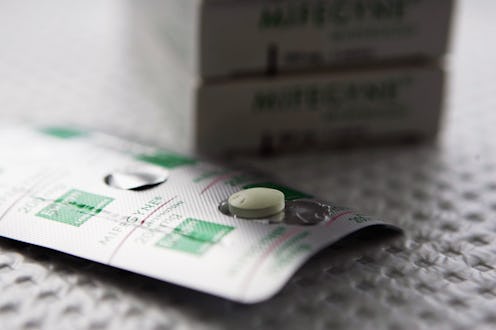News
Texas Women Are Turning to This Abortion Drug
Weird. It turns out shutting down abortion clinics doesn't actually get rid of abortion. Misoprostol, an off-label abortion drug meant for ulcer treatment, seems to be replacing clinics in Texas as women's health care and abortion providers get more and more difficult to find, The Atlantic reports. The drug, sometimes called miso or Cytotec, induces abortions that look like miscarriages, making it the ideal cover for women who feel they have no choice but to terminate a pregnancy.
In The Atlantic, Erica Hellerstein reports that use of the drug is on the rise in Texas and should rise more as restrictive anti-abortion laws continue to gain steam in the south. The use of the drug for abortion has up 'til now been more readily associated with Latin and South America, where Catholic culture has kept use of the drug under wraps for years.
But it's known as a drug that can be used for abortion, as well as one that's useful in limiting post-birth bleeding in women. For the latter purpose, it's often distributed in developing countries to prevent the deaths of women who have recently given birth, according to Voice of America. It can also be used to induce labor in women who have carried their babies to term, though the FDA has said this use could be dangerous.
Abortions are on the rise on Texas; the state's been on the front lines of using legislation to sneakily shut down abortion clinics without directly challenging the legality of abortions directly. (Roe v. Wade, though still disputed, pretty clearly laid out a woman's right to abortion in the United States, at least in the beginning of a pregnancy.) As a result, conservative states have spent a lot of time crafting laws meant to make it hard for abortion clinics to stay open — and thus, for women to access those clinics.
This is the issue Wendy Davis spent so much time talking about during her filibuster last year. Basically, Texas introduced a law that would require abortion doctors to have "admitting privileges" at a local hospital to be able to continue practicing at a clinic like Planned Parenthood. This was marketed as something that would protect women — admitting privileges sound like something you want your doctor to have, right? In reality, local hospitals often won't take on these doctors out of fear of getting politically involved, and doctors don't need them to perform safe abortions. But the law passed anyway, and so have similar ones in Louisiana and other states, shuttering many of the already-sparse clinics in the south.
The FDA has never approved miso as an abortion drug, probably because there are many, many on-label drugs that work. But because those drugs and the doctors and clinics that administer them are under sustained attack by anti-abortion activists, it's created an opening for drugs like miso.
That's less safe for everybody, because women seeking an abortion should have the opportunity to consult with a doctor and be prescribed medication, not try and obtain pills on the black market. The rising use of misoprostol is just more evidence that restricting clinics like Planned Parenthood doesn't create fewer abortions; it just makes women less safe.
